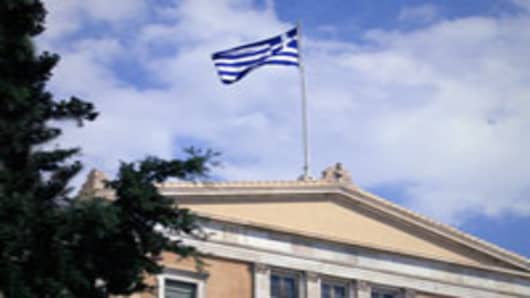This is what it’s down to: The Germans don't trust the Greeks. They think that whoever comes to power after the Greek elections in April will immediately renounce the austerity measures that they will have been forced to sign in the coming days.
The solution: An escrow account. The 130 billion euro ($171 billion) bailout fund would be put it into an escrow account that would be used to pay off the holders of Greek debt. The remaining money would be used to fund the Greek government, but only if the austerity were actually implemented.
This has the beauty of offering Greece the fig-leaf that it still controls its budgetary destiny, but gives the Germans actual control of the money.
Will this fly? Who knows? It's another last-minute floater from the Germans and French. But it’s a workable way around the distrust that is so evident.
Elsewhere:
1) A “technical glitch?” The IPO of Caesars Entertainment, set to price last night, was postponed due to what one unnamed underwriter called a “technical glitch;” it may price by mid-afternoon. Huh? Something with the Securities and Exchange Commission? Something in the prospectus? It plans to sell 1.8 million shares in its IPO at between $8 and $10 a share, but other shareholders have registered to sell additional stock. Very strange.
By the way, its is scheduled to price $1.25 billion in notes tomorrow. This company already has lots of debt.
2) BHP Billiton, Rio Tinto, and Freeport-McMoRan slide after miner Xstrata formally announced plans to merge with commodities giant Glencore in a deal that will create a $90 billion natural-resource company.
3) You wonder why trading volume is weak: Two big global banks — Macquarie in Australia and UBS in Switzerland — both issued somewhat gloomy comments. Both noted that the investment banking business (primarily equities and fixed income trading) were down, with clients more reluctant to trade.
Any wonder why equity volumes have been so poor? Not only are prop trading desks being dismantled, the banks' own customers have been trading less.
Not surprising, private banking operations — the traditional wealth management businesses — did well.
Macquarie said profits for the quarter ending in March would be 25 percent below the same period last year. It's not just investment banking: It noted that corporate finance earnings would be down 30 percent.
Elsewhere, not so gloomy. Two companies upped their outlooks:
4) Toyota Motor shares rise 2.1 percent after the automaker boosted its 2012 forecast by more than a third as it cuts costs, trims spending, and anticipates Japanese government schemes will boost sales. Though the company seems to be eyeing recovery, its guidance is still below analysts’ expectations. With two natural disasters — an earthquake and tsunami last March in Japan and the Thai floods late last year — nearly behind it, Toyota expects sales to jump by more than a fifth this year to a record 9.6 million vehicles.
5) ArcelorMittal jumps 2.2 percent after the world’s largest steelmaker forecast a pickup in the first half of 2012. The company expects steel shipments will return to the level seen at the beginning of last year and sees continued growth in its mining output, with a clear pick up in North America. The company attributed a widening of fourth-quarter losses to growing uncertainty in Europe, which ArcelorMittal expects to remain a concern in 2012.
6) Coca-Cola shares rise 1.1 percent in pre-market trading after reporting fourth-quarter earnings per share of 79 cents a share, beating analysts’ expectations by 2 cents. The company said its international footprint helped its overall results as global revenue rose 5 percent to $11 billion and worldwide volume increased by 3 percent. About two-thirds of Coca-Cola's profits are generated from outside the U.S., a much greater percentage than that of rival PepsiCo. Additionally, the soft-drink maker announced a productivity program aimed at saving $550 million to $650 million by the end of 2015.
7) Becton Dickinson slumps 6.9 percent after reporting a drop in fiscal first-quarter earnings and lowering 2012 profit forecast by 15 cents due to the strengthening dollar. The medical-device maker’s earnings per share beat estimates, though the company reported first quarter earnings fell more than 10 percent to $1.21 a share on higher raw materials costs and expenses from recent acquisitions.
_____________________________
Bookmark CNBC Data Pages:
_____________________________
Want updates whenever a Trader Talk blog is filed? Follow me on Twitter: twitter.com/BobPisani.
Questions? Comments? tradertalk@cnbc.com



